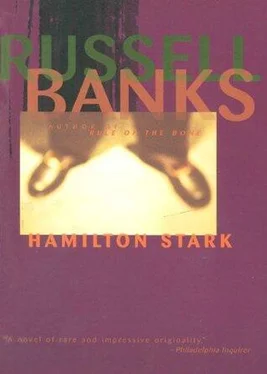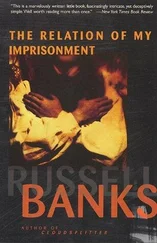When she first met Hamilton, Dora knew nothing of the stories about him that had circulated for years in and around Barnstead, mainly because, until she married him, she had never been to Barnstead. She had been living in Concord at the time, in a small and rather drab apartment. And since her divorce six months earlier from her first husband, Harry Franklin, a man she had loved deeply and loyally for twenty-three years, she had lived there alone, extremely depressed, quietly trying to heal the deep, suddenly inflicted wounds that had precipitated the divorce. What had inflicted the wounds was her accidental discovery that her husband Harry Franklin had been a lifelong philanderer, and she alone, of all the people who had known him these many years, she alone had been unaware of this aspect of his character. In fact, to her embarrassment, she had thought of him as sexually cold, almost unresponsive, not just to her but to all women. She had even developed a kind of condescending, maternal affection for his nature, often referring to him as a cold fish, a stodgy haberdasher on whom, she felt, all sexual innuendoes and provocations were lost. And when finally his true nature came out (broadcast hysterically by one of his girl friends, who, not as trusting as Dora, had trailed him and had discovered that he was betraying her, too), she had felt as if he had yanked her legs out from under her. And when, through some perverse determination to “clear his conscience once and for all,” Harry had revealed to his poor wife the names of all the many women he had slept with over the years, continuing for weeks to remember and then to confess yet another old and all-but-forgotten liaison, when his confessions were finally over, Dora felt as if her life had been cut to pieces, the pieces cast into the sea, like so much garbage, to float there, swelling in the sun, picked at by gulls above and nibbled by passing fish below. It was in such a state, then, deeply depressed, beaten — a woman so deceived that any further deception would be meaningless, for there was now nothing left to “protect” her from — in such a state, one night after work, she had stopped for a drink alone in a cocktail lounge next to the typesetting shop where she was a compositor, and she had met Hamilton Stark.
They were seated at the leather-covered bar in the artificial gloom; he was a little drunk, and soon so was she. Perhaps she was attempting to put a little cynicism into her life, to see if it could lift her spirits a bit, even if only briefly, and when he had idly mentioned his displeasure with the place, what he called its “ad-man décor,” she had just as idly suggested that they adjourn to her apartment for the evening, where, she said, the décor was “early Woolworth’s.” He had asked her if she had a television set; she had said yes, a color set, and he had been delighted. There was a Frank Sinatra special on that night that he wanted to see. “Ol’ blue eyes,” he had called him. “You know that song he sings, ‘I Did It My Way’?” he asked her. She thought she knew the song. “Well, that’s me,” he said.
She married him within a week. The reasons were obvious to everyone who knew her. “She’s marrying the pipefitter because of what it’ll do to Harry,” they said. It was presumed that she did it so Harry Franklin would regard her new marriage as the act of a broken, possibly deranged woman, and therefore, people reasoned, he would feel guilty. “As well he should,” they clucked. It was, of course, no less possible that her marrying Hamilton after knowing him over drinks and color TV for only a week was the act of a broken, possibly deranged woman, in fact, and that how Harry the haberdasher might feel about it had never once occurred to her. But no one thought of that possibility. People tend to see ulterior motives everywhere these days, even in grief and woeful distraction.
They were married by a justice of the peace, a man who ran a large dairy farm and ice cream stand in Northwood, and a few days later, Hamilton’s mother died. Dora had barely unpacked her clothes and color TV. The kitchen set and bedroom suite they had purchased together, as a cynical nod to the forms of sentiment, had been delivered that afternoon, and she had just finished tucking in the linen, placing her combs, brushes, make-up and jewelry neatly on the dresser, moving first one article, then removing them all and starting over again, trying to make these dozen articles look as if they had been on top of that dresser for twenty-three years, when the phone rang. It was the first time it had rung in the three days since she had moved in, and she rushed out to the kitchen to answer it.
It was Sarah, Hamilton’s sister, she knew, even though they had never met, calling to inform her that her new mother-in-law, after a lengthy illness, had died in her sleep the night before. Funeral services would be held at the First Congregational Church in Barnstead at 1:00 P.M. on Saturday, December 1, two days later. Dora started to respond to this news and the, to her, peculiar way in which her new sister-in-law had conveyed it, but before she could utter a word, even a stammer of sympathy, Sarah had hung up.
That evening, when Hamilton came home from work (he was then the foreman for the plumbing, heating and air-conditioning systems on the new Tampax factory being built in the southwestern part of the state and was driving forty miles each way to work every day), she told him, word for word and in the same tone of voice, what Sarah had told her. She prefaced her bulletin, naturally, by telling him that his sister had called him that afternoon with some “shocking” news.
“Oh? Which sister?”
“Sarah.”
“What was the news?”
She told him.
“Anything else?”
“No, nothing else. Just ‘click,’” Dora said, miming the act of hanging up a telephone receiver.
“‘Click,’ eh?”
“Yes. ‘Click.’”
Hamilton sat down slowly at the kitchen table in the chair that faced the window. It was where his father had always sat. At breakfast he could see Blue Job as it caught the day’s first light, and in the late afternoon he could watch it lose light and slowly turn gray until finally it loomed darker than the sky that surrounded it.
He asked her to tell him when the funeral was to be held, and she repeated Sarah’s message. It was a message, she assumed, even though it had come in the form of an obituary notice. She wanted to ask him about Sarah, about his other sister, Jody, and about his mother, too, but she did not dare, not now. Until this moment, she had not once wondered about these people; she had been too preoccupied with how her marriage to Hamilton fit or did not fit into her own private, truncated past. And now that she wanted to know about his past, if for no other reason than to be better able to comfort him at such a bad time, she was afraid to — for he had begun to growl, low in his chest and throat, like a large and vicious animal. He sat there, looking dead-eyed out the window at the gathered darkness, his hands fisted heavily on the tabletop, and growled.
Very slowly, one silent step at a time, she backed away from him, and then left the room altogether. In seconds she had left the house and was outside in the front yard, standing next to the car, a green Chrysler airport limousine he had recently purchased, wondering if she should flee down the road in his car, which so far he had not allowed her to drive, or return to the house and try to comfort him. She had never heard anyone growl aloud like that, and she had never seen a person’s eyes go dead before, and she was terrified. Harry Franklin, when his mother had died, had cried like a baby, she remembered with sudden affection. And she had held him in her arms and crooned soothingly to him while for hours he had catalogued his childhood memories of the woman. What could this woman have done to Hamilton to have evoked such an enraged response? Clearly, it was rage — those eyes, that growl, the enormous fists on the smooth Formica-topped table — but rage at whom? Somehow it did not seem directed at his mother. No, the rage belonged elsewhere, and that was why Dora was so frightened that, rather than try to comfort him, she had fled from him, had tiptoed out to stand coatless by the car in the cold November twilight and wonder if she should flee still farther from him.
Читать дальше












